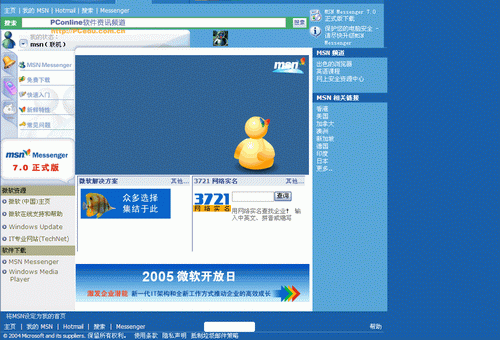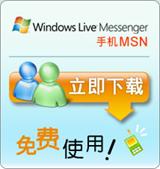Mobile MSN teams up with Mobile to reach into customers' pockets
The gradual popularization of smart phones has given strong support to mobile communications operators in developing new business. Using mobile phones to surf the Internet has become a very widely used service among young people nowadays, and smart phones can provide more instant messaging functions. One of the most important tools is the mobile version of MSN. However, we recently received such news: Mobile MSN will be discontinued after July 31, and to continue using it, users must download the new version. This sudden change surprises us, but for most users, the most concerning issue is how the charging between the old and new versions will change?
According to relevant information, the new version of Mobile MSN 2.0 has changed from the SMS application mode of the old version to the GPRS wireless Internet mode. Compared with the old version (SMS version) charge of 10 yuan/month, its download and use are completely free. However, the GPRS traffic fees incurred during the use of the new version of MSN are charged by the local China Mobile Communications operator. Currently, it does not support Unicom users, which means that mobile users will inevitably incur additional expenses if they use the mobile version of MSN.
Regarding compatibility issues, relevant responsible persons of MSN said that mobile phone users need not worry. The new version of Mobile MSN supports more than 400 mainstream (Mobile GSM) mobile phones, including Nokia, Motorola, Sony Ericsson, Lenovo, etc. For users, as long as they activate the GPRS monthly subscription service during use, the cost will be cheaper. But is it really so? Not long ago, Jiangsu Mobile canceled the GPRS traffic monthly subscription discount, forcing mobile users to choose the traffic-based billing package. Although this change seems on the surface to be cheaper than the original SMS billing method, due to providing more applications, most users will encounter the problem of exceeding the traffic limit, which will directly lead to an increase in costs. However, the new version of MSN indeed has many improvements. The problem in the old version where users' MSN contacts could not receive messages sent from the computer end when they were offline has been resolved in the new version. This issue has long been solved in the MSN we use on our computers, and the mobile application seems to lag behind significantly. According to the current situation, is this a trick to align with the mobile billing strategy?
The new mobile version of MSN is definitely better to use than the old version, but after switching to GPRS Internet applications, there will be a significant increase in the charges for new services by China Mobile. On the surface, users can save the 10 yuan monthly usage fee by switching to the new version, but because China Mobile recently canceled the GPRS monthly subscription package, tech-savvy young people often try various exchanges such as voice, text, pictures, browse the web, and play some online games. In these situations, exceeding the traffic limit is inevitable. This is probably what MSN and China Mobile are most pleased to see, as they can significantly increase their revenue from value-added services. Considering that China Mobile previously canceled the unlimited GPRS traffic monthly subscription package, it appears they were well prepared. We also believe that more related value-added services will be launched subsequently. The basic call function of mobile phones may be overshadowed by these services, and consumers will definitely have to pay much more!




